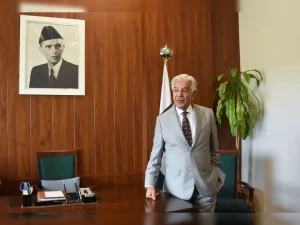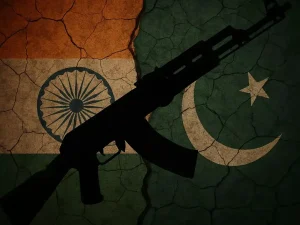New Delhi – Pakistan has raised a serious Pakistan India strike alert, claiming to possess “credible intelligence” that India is planning a military strike against Pakistani territory within the next 24-36 hours. The alarming declaration was made by Pakistan’s Information Minister Attatullah Tarar on Wednesday as tensions between the two nuclear-armed neighbors continue to escalate following the deadly terrorist attack in Kashmir’s Pahalgam region.
“Pakistan has credible intelligence that India intends carrying out military action against Pakistan in the next 24-36 hours on the pretext of baseless and concocted allegations of involvement in the Pahalgam incident,” Tarar stated in a post on X (formerly Twitter), establishing the Pakistan India strike alert that has further intensified regional concerns about potential armed conflict.
Also Read: Ex-Pakistan Army Commando Hashim Musa: Mastermind of Brutal Pahalgam Attack
The Pakistan India strike alert comes amid deteriorating diplomatic relations between the two countries after India suspended the Indus Waters Treaty and Pakistan responded by closing its airspace to Indian airlines. These measures reflect the growing hostility that has characterized bilateral ties since the April 22 terrorist attack that claimed 26 civilian lives in Jammu and Kashmir’s Pahalgam district.
Details Behind the Pakistan India Strike Alert

According to Tarar, the Pakistan India strike alert is based on intelligence assessments that suggest India has “self assumed” the role of judge, jury, and executioner in attributing blame for the Pahalgam terrorist attack to Pakistan. The information minister emphasized that Pakistan itself has been a victim of terrorism and has consistently condemned all forms of violent extremism.
“Being a responsible state, Pakistan open heartedly offered a credible, transparent and independent investigation by a neutral commission of experts to ascertain the truth,” Tarar explained, framing the Pakistan India strike alert as a necessary warning in the face of what Islamabad perceives as irrational Indian aggression. “Unfortunately, rather than pursuing the path of reason, India has apparently decided to tread the dangerous path of irrationality and confrontation, which will have catastrophic consequences for the complete region and beyond.”
The Pakistan India strike alert reflects Islamabad’s concern that New Delhi might be preparing a military operation similar to the 2019 Balakot airstrike, which was carried out in response to the Pulwama terrorist attack. That operation represented the first time since the 1971 war that Indian warplanes struck targets inside undisputed Pakistani territory, setting a precedent that the current Pakistan India strike alert suggests might be repeated.
Military Readiness Following Pakistan India Strike Alert
In response to the Pakistan India strike alert, Defense Minister Khawaja Muhammad Asif told Reuters that Pakistani armed forces have been placed on high alert. The defense minister’s statement underscores the seriousness with which Islamabad is treating the intelligence behind the Pakistan India strike alert, mobilizing military assets to respond to any potential incursion.


“Pakistan would respond to any military action undertaken by India,” Asif stated, reinforcing the Pakistan India strike alert with a clear warning about potential counteractions. He emphasized that the country would prioritize the protection of its territorial integrity and sovereignty in the face of any Indian aggression.
In a significant clarification that accompanied the Pakistan India strike alert, Asif addressed concerns about nuclear escalation, stating that Pakistan would only use its nuclear weapons if there was a direct threat to the nation’s existence. This statement appears designed to temper international concerns while still maintaining a firm posture in response to the Pakistan India strike alert situation.
India’s Stance and Recent Statements Related to the Pakistan India Strike Alert
While India’s foreign ministry has not directly responded to the Pakistan India strike alert issued by Tarar, recent statements by Prime Minister Narendra Modi have heightened concerns in Islamabad. On Tuesday, Modi chaired a meeting with the military brass in New Delhi, where he reportedly granted the armed forces “complete operational freedom to decide on the mode, targets and timing” of India’s response to the Pahalgam attack.
Modi’s assertion that “it is our national resolve to deal a crushing blow to terrorism” has been interpreted by Pakistani officials as a precursor to military action, lending credence to the Pakistan India strike alert. The Indian prime minister’s message that security forces are free to conduct operations as they deem fit to root out terrorists in Jammu and Kashmir has further escalated tensions in the context of the Pakistan India strike alert.
India has consistently maintained that there were Pakistani elements involved in the Pahalgam terror attack, a position that has contributed to the breakdown in diplomatic relations now characterized by the Pakistan India strike alert. New Delhi’s decision to suspend the Indus Waters Treaty—a cornerstone agreement governing water sharing between the two countries—signals the severity of India’s response even before any potential military action referenced in the Pakistan India strike alert.
Diplomatic Fallout and International Implications of the Pakistan India Strike Alert
The Pakistan India strike alert comes after both nations have already taken significant diplomatic measures against each other. Following the Pahalgam attack, India reduced diplomatic mission strength with Pakistan by half, expelled diplomats and defense officials from the Pakistan High Commission, cancelled visas for Pakistani nationals, and closed the Attari-Wagah border crossing.
Pakistan’s issuance of the Pakistan India strike alert appears designed to internationalize the conflict by drawing global attention to what it characterizes as Indian aggression. By publicly announcing the Pakistan India strike alert, Islamabad may be attempting to create diplomatic pressure on New Delhi to refrain from military action while positioning itself as taking a defensive rather than provocative stance.
International observers note that the Pakistan India strike alert represents another dangerous escalation in a relationship that has experienced numerous cycles of tension since the two countries gained independence in 1947. The involvement of nuclear weapons in the strategic calculations of both nations, now explicitly referenced in statements surrounding the Pakistan India strike alert, adds a layer of global concern to what might otherwise be viewed as a regional conflict.
Historical Context of the Pakistan India Strike Alert


The current Pakistan India strike alert fits into a historical pattern of heightened tensions following terrorist incidents in Kashmir. After the 2019 Pulwama attack that killed 40 Indian security personnel, India conducted an airstrike on an alleged terrorist training camp in Balakot, Pakistan. This was followed by an aerial dogfight that resulted in the downing of an Indian fighter jet and the brief capture of its pilot by Pakistan.
The statement issued suggests that both nations may be following a similar script, with Pakistan now attempting to preempt potential Indian military action by publicly revealing what it claims to know about India’s intentions. This approach represents a departure from traditional diplomatic protocols but reflects the deteriorated state of bilateral relations highlighted by the Pakistan India strike alert.
Final Word: Regional Implications of the Pakistan India Strike Alert
The alert to present the evidence issued by Minister Tarar underscores the volatile nature of relations between the two nuclear-armed neighbors. With both countries having moved beyond diplomatic measures to threats of military action, the international community faces renewed concerns about stability in South Asia.
Whether the intelligence cited in the statement proves accurate or not, the public nature of this warning demonstrates how quickly territorial disputes and terrorism allegations can escalate between these nuclear-armed neighbors, highlighting the urgent need for sustainable dialogue mechanisms that can withstand periodic crises.

